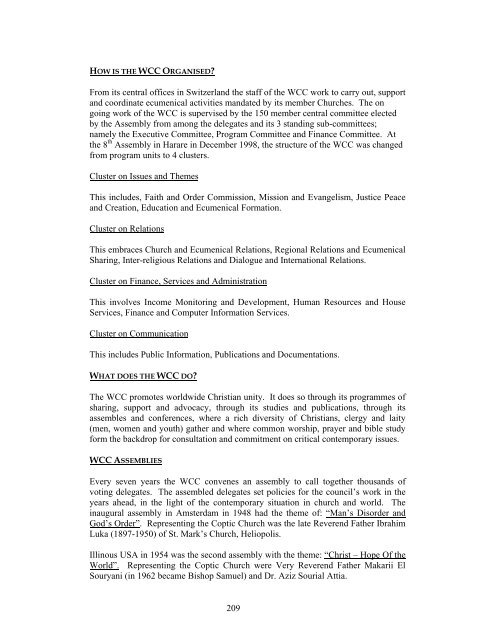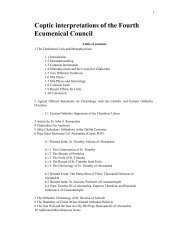Coptic Church & Ecumenical Movement - Saint Mina Coptic ...
Coptic Church & Ecumenical Movement - Saint Mina Coptic ...
Coptic Church & Ecumenical Movement - Saint Mina Coptic ...
Create successful ePaper yourself
Turn your PDF publications into a flip-book with our unique Google optimized e-Paper software.
HOW IS THE WCC ORGANISED?<br />
From its central offices in Switzerland the staff of the WCC work to carry out, support<br />
and coordinate ecumenical activities mandated by its member <strong>Church</strong>es. The on<br />
going work of the WCC is supervised by the 150 member central committee elected<br />
by the Assembly from among the delegates and its 3 standing sub-committees;<br />
namely the Executive Committee, Program Committee and Finance Committee. At<br />
the 8 th Assembly in Harare in December 1998, the structure of the WCC was changed<br />
from program units to 4 clusters.<br />
Cluster on Issues and Themes<br />
This includes, Faith and Order Commission, Mission and Evangelism, Justice Peace<br />
and Creation, Education and <strong>Ecumenical</strong> Formation.<br />
Cluster on Relations<br />
This embraces <strong>Church</strong> and <strong>Ecumenical</strong> Relations, Regional Relations and <strong>Ecumenical</strong><br />
Sharing, Inter-religious Relations and Dialogue and International Relations.<br />
Cluster on Finance, Services and Administration<br />
This involves Income Monitoring and Development, Human Resources and House<br />
Services, Finance and Computer Information Services.<br />
Cluster on Communication<br />
This includes Public Information, Publications and Documentations.<br />
WHAT DOES THE WCC DO?<br />
The WCC promotes worldwide Christian unity. It does so through its programmes of<br />
sharing, support and advocacy, through its studies and publications, through its<br />
assembles and conferences, where a rich diversity of Christians, clergy and laity<br />
(men, women and youth) gather and where common worship, prayer and bible study<br />
form the backdrop for consultation and commitment on critical contemporary issues.<br />
WCC ASSEMBLIES<br />
Every seven years the WCC convenes an assembly to call together thousands of<br />
voting delegates. The assembled delegates set policies for the council’s work in the<br />
years ahead, in the light of the contemporary situation in church and world. The<br />
inaugural assembly in Amsterdam in 1948 had the theme of: “Man’s Disorder and<br />
God’s Order”. Representing the <strong>Coptic</strong> <strong>Church</strong> was the late Reverend Father Ibrahim<br />
Luka (1897-1950) of St. Mark’s <strong>Church</strong>, Heliopolis.<br />
Illinous USA in 1954 was the second assembly with the theme: “Christ – Hope Of the<br />
World”. Representing the <strong>Coptic</strong> <strong>Church</strong> were Very Reverend Father Makarii El<br />
Souryani (in 1962 became Bishop Samuel) and Dr. Aziz Sourial Attia.<br />
209








